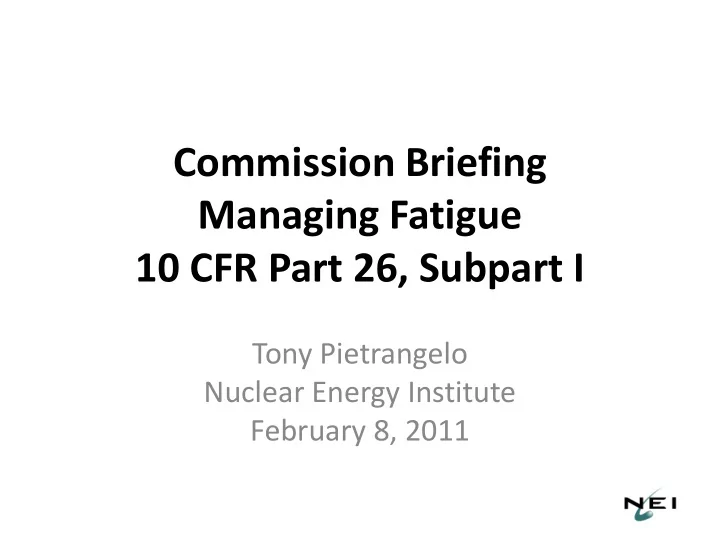

Commission Briefing Managing Fatigue 10 CFR Part 26, Subpart I Tony Pietrangelo Nuclear Energy Institute February 8, 2011
Industry Actions • October 1, 2009- Industry implements rule • June 2010- NEI surveys industry for any rule implementation issues • September 3, 2010- NEI submits petition for rulemaking to address unintended consequences • September 23, 2010- NEI submits request for enforcement discretion 2
Problem Statement • The complexity and rigidity of the fatigue rule has resulted in unintended consequences that have impacted safety beneficial practices, adversely impacted quality of life, and created conflicts with bargaining unit agreements • The complexity and rigidity result in large part from the minimum day off provisions of the rule 3
Justification for Change • Long-standing safety-beneficial practices have been adversely impacted – Shift leader meetings – Just in time training – Time in LCOs has been extended – Licensed Operator off-shift functions curtailed – First line supervisor admin time increased 4
Justification for Change • Quality of life adversely impacted – Schedule uncertainty – Forced overtime – Inability to trade shifts – Family impacts – Increased frustration, anger and stress 5
Justification for Change • Bargaining unit agreements adversely impacted – >1000 grievances filed – Overtime equalization – Forced overtime – Reciprocity for contractor work hours – Paid rest time 6
Proposed Interim Approach • Agreement with NRC staff on 54 hours/week average for all covered workers over a rolling period not to exceed 6 weeks • Work week average applicable to all covered workers 7
Benefits of Interim Approach • More flexibility in scheduling due to no MDO would allow reinstatement of safety beneficial practices • Complexity of 8/10/12 hr shifts eliminated • Same limits for all work groups • Workers able to track their own hours 8
Authorization to Proceed • Clear industry preference for enforcement discretion – Timely restoration of safety-beneficial practices – Minimizes administrative burden on the staff – Facilitates industry transition to interim approach 9
Going Forward • Industry recommends Commission SRM to authorize interim approach • Industry will monitor and trend implementation of interim approach • Industry will continue dialog with NRC staff on implementation • Industry looks forward to timely consideration of petitions for rulemaking 10
Acronyms • MDO – Minimum Days Off • SRM – Staff Requirements Memorandum • LCO – Limiting Conditions of Operation 11
Recommend
More recommend